I decided to run a little experiment to see just how helpful AI can be to my blog writing process—if at all. I already knew it wouldn't be a set-it-and-forget-it kind of thing. But could it help save me time? And, more importantly, could it improve the quality of my content?
Here's what happened when I tried it, along with a suggested workflow (and free Notion template) to help you incorporate AI into your content creation process.
My AI blog writing experiment
Using Notion's AI assistant is easy; just hit the space bar in a new line anywhere in Notion. The AI assistant appears instantly, offering several available actions.
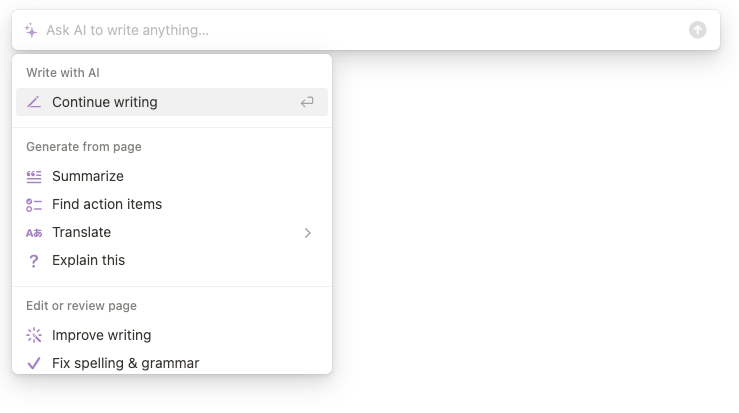
To test its capabilities to their fullest extent, I used every applicable feature while writing a post for my personal blog:
-
Brainstorming topics
-
Summarizing research
-
Creating an outline
-
Writing a draft
-
Making content longer (or shorter)
-
Fixing spelling and grammar
-
Changing tone
Brainstorming topics
The AI assistant brainstorms for you, which can be helpful when coming up with initial topics to write about. I asked the AI to brainstorm blog topics about automation. Here's what it came up with.
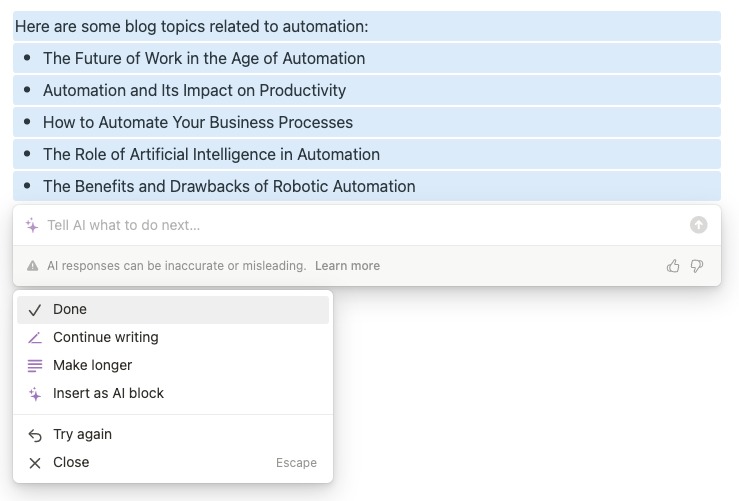
These are decent ideas, but nothing groundbreaking. There's also no way to tell whether these topics work well for my audience's search intent—I still needed to turn to other keyword research and SEO tools to find the best topic for my blog.
But as a brainstorming tool, it's not bad.
Start a brief
Next, I used the "outline" feature to generate an outline for my blog post.

The results were a bullet-pointed list of ideas obviously pulled from similar articles around the web. The bullet points were extremely simple, but they were a good place to start.
I still needed to do my own research to ensure this outline was (1) accurate and (2) thorough. Overall, I found the outline to flow logically. But if I were planning to send this as a brief to another writer, I'd need to add a bit more context—like information on my target reader—and a few useful links for additional research on their part.
Summarize research and organize interview notes
Notion AI, like many AI writing apps, has a summarize feature that pulls key ideas from content. This feature can be extremely useful if you're doing research for a new post and don't have time to read lengthy articles or scholarly studies.
Copy and paste the content into Notion, then have the AI assistant summarize it.
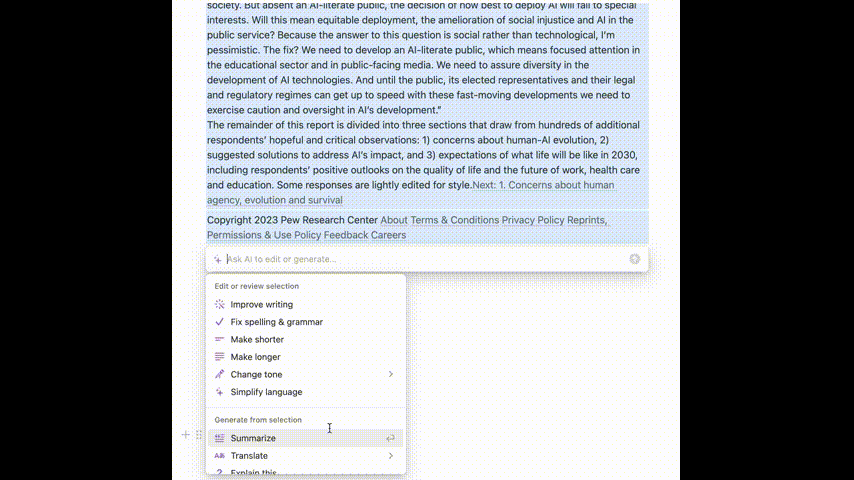
You can also ask the assistant to "explain this," or even type in your own prompt, like "Pull out common themes from this data." Each option produces more detailed results than the last, but they're all relatively short, easily digestible paragraphs.
You can also create AI blocks to summarize, expand on, or generate key takeaways from the content on the page. If you or your agency uses templates to take notes in interviews, for instance, adding an AI block at the bottom of your template could be useful.

Have Notion AI write your (very) rough draft
Next, you can ask the AI to write a whole blog post draft for you. The assistant offers quite a few options to choose from.
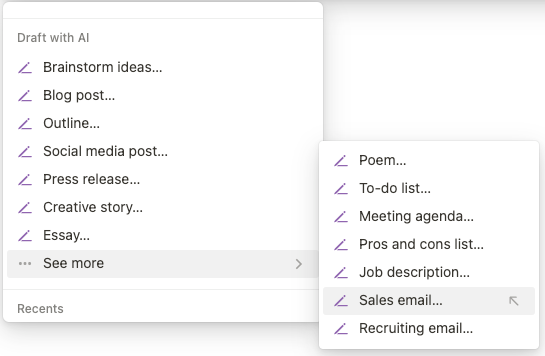
I asked it to draft a blog post on my chosen topic. Here's a real-time look at my little robot friend drafting up a storm.
While it's fun to watch Notion draft something that would normally take me a couple of hours, I wasn't all that impressed with the result. I wasn't expecting much in the way of creativity or depth, mind you—but it wasn't even interesting to read. Sure, the grammar is ok, and the tips in the article are decent. It's as if someone who writes at the middle-school level did a quick Google search on the topic and regurgitated what everyone else is saying.
Which, let's be honest, is basically what's happening here—just in five seconds.
Will AI content writing improve as the technology does? Maybe. But for now, it's safe to say you can't rely on AI to do your writing for you (for a lot of reasons).
Especially if you've already used Notion AI to create an outline (as I did), you're better off taking it from there and drafting the post yourself. I ended up scrapping the entire AI-generated draft and writing the article on my own.
Fix spelling and grammar
Once you're finished writing, you can use Notion's grammar assistant to help catch grammar and spelling mistakes. If you use tools like Grammarly or ProWritingAid, you're familiar with this type of feature.
I tested the grammar checker function by writing an atrociously mistake-ridden paragraph and seeing how many mistakes the AI assistant could catch.
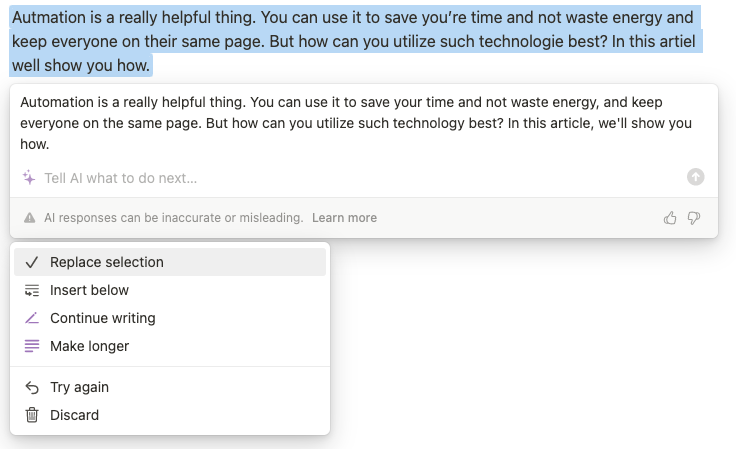
As you can see, the assistant did a decent job. It's still lacking in style suggestions, though; if I were editing this paragraph myself, I would've suggested turning that second sentence into "You can use it to save time and energy while keeping everyone on the same page." But I guess you can't (yet) expect robots to have an eye for aesthetics, right?
Change tone
Next, I experimented with the tone changer function. You can ask the AI assistant to change the tone of a selected text to professional, casual, straightforward, confident, or friendly. I wrote a couple of (very) casual sample paragraphs and asked Notion AI to give them a professional tone.
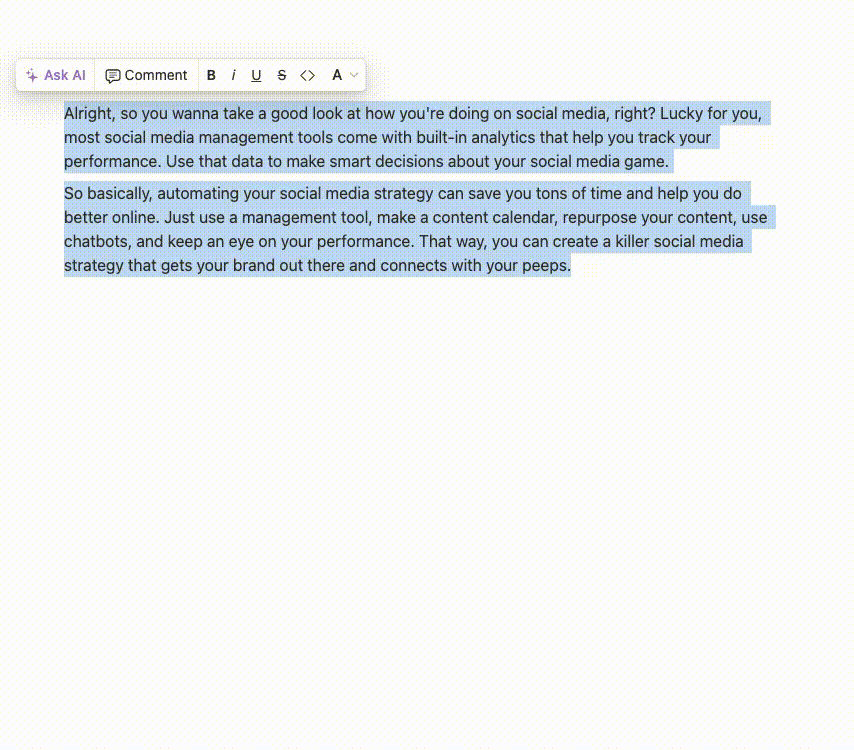
Not bad. The main ideas are all there, but the tone is elevated to a more formal style. It could still use some stylistic polishing, but it's a good start.
Make longer or shorter
Finally, I experimented with the "make longer" function—and I have to say, I was impressed.
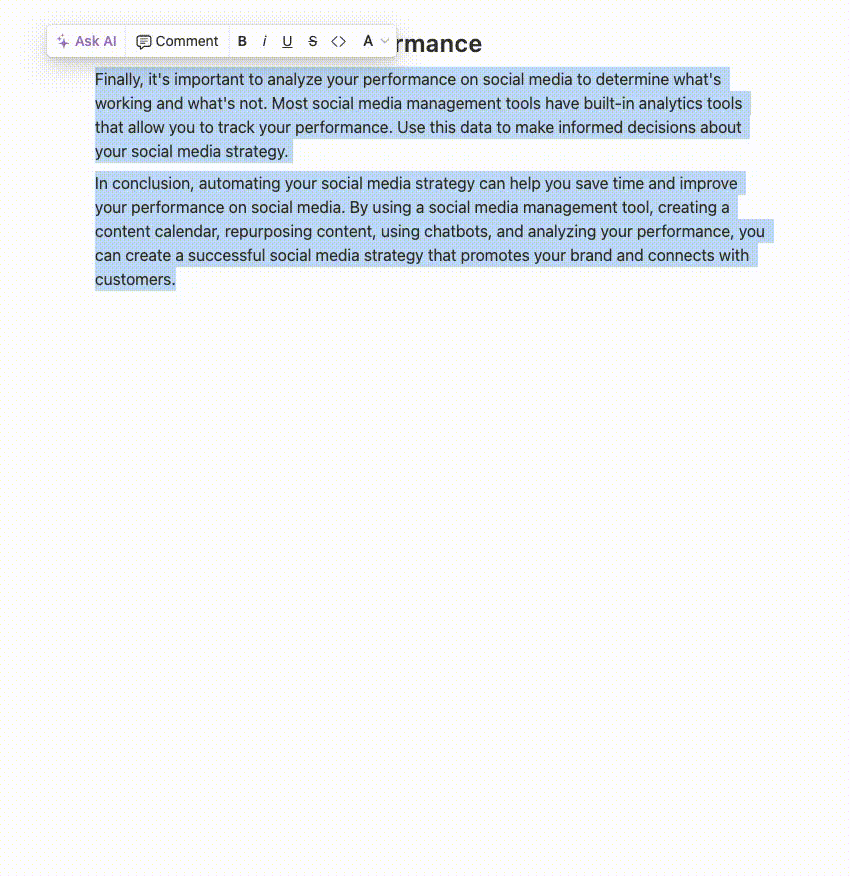
I was expecting the AI assistant to simply make the paragraphs wordier, but it added a helpful example that took the thoughts in the section even further. I could definitely see myself using this tool to flesh out ideas and inspire me to make my blog posts more thorough.
So, can I use AI to help write my blog posts?
After working through my blog production process while using every possible Notion AI tool at my disposal, here are my conclusions.
The brainstorming and summary tools were the biggest time-savers
Since I felt like I needed to double-check any original content Notion AI created (like an outline or draft), the tool didn't save me a ton of time during the process. The exception was the brainstorming stage: it was a great launching point for thinking of even more ideas on my own.
The summarize tool was also a time-saver. I loved being able to paste long articles into Notion and get a quick, one-paragraph summary with key takeaways. Of course, I knew I was losing nuance, but at certain phases of the process, just getting a high-level understanding is a good start. And I could definitely see how the custom AI blocks would come in handy for summarizing lengthy notes with an interview subject.
The AI improved my workflow—but it came at a cost
Notion AI improved my workflow by helping me brainstorm, summarize research, and expand on ideas (using the "make longer" function). And because I was still closely involved in every stage of the blog writing process, the final product was on par with my usual work.
But I did have to work to overcome a few drawbacks. Since I know AI tools are prone to factual errors, I had to take the time to double-check everything it generated. And the tool essentially regurgitates the most popular content on the web when it creates outlines or drafts, so its output felt derivative and uninteresting.
In short: I ended up working doubly hard to inject my own voice and write something with a point-of-view that felt human and fun to read.
It's important to stay involved in the process
I'll be using AI as a way to kickstart my creativity at the beginning and fine-tune my product at the end. Based on my experiment, here's my suggested workflow if you want to incorporate AI into your team's blog writing process:
-
Brainstorm topics using AI, then use those topic ideas to conduct keyword research and narrow down topic ideas.
-
Use AI to create a basic outline, then tweak it as needed for logical flow (and to fill in content gaps).
-
Research the topic on your own (using AI to summarize lengthy articles or pull key takeaways from interview notes, if needed).
-
Write a draft (using a "make longer" tool to expand on ideas if you feel stuck or uninspired).
-
Edit the piece (using AI to fix spelling and grammar errors or change your tone as needed).
I created a template for my new blog workflow, which you can copy for your own use here. Each new database item comes pre-filled with helpful AI content blocks along each step of the content creation process.
To save your content team even more time, you can use Zapier to automate processes and connect Notion to the rest of your tech stack. Check out our article on How to use Zapier to automate Notion for inspiration.
Related reading: